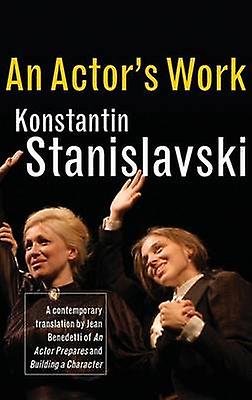§01. Amateurism (Konstantin Stanislavski, An Actor’s Work)

THEATRE
This article is my summary of the 1st chapter of An Actor’s Work by Konstantin Stanislavski. This book is a new edition and English translation by Jean Benedetti of the material previously published under the titles « An Actor Prepares » and « Building A Character« .
Next chapter: §2. The stage as art and stock-in-trade (Konstantin Stanislavski, An Actor’s Work)
Table of contents: An Actor’s Work (Konstantin Stanislavski)
To start the first year of study of the System, Tortsov asks the pupils to prepare on their own a showing in which each of them will present an extract from a play of their own choice.
Kostya chooses a scene from Othello by Shakespeare. In his diary, he narrates his preparation, his rehearsals and finally his performance, reporting in particular about:
- the way acting and the text of the play can feel like obstacles to each other
“Rather than helping me, the actual lines got in my way. I would have been happy to do without them, or to have cut them by half. Not only the words but also the author’s thoughts, which were not mine, as well as the actions he indicated, limited the freedom I had enjoyed when studying at home.” (p. 8)
“The words got in the way of the acting, and the acting got in the way of the words. A general feeling of discordance all round.” (p. 8)
- the domination of habits
“It was obvious I couldn’t play my savage except by using the ways I knew. But I wasn’t in control of them, they were in control of me. What was this ? Slavery ?” (p. 9)
- the way the actor’s attention is irresistibly drawn to the audience – and what can make him forget about them.
“As soon as I stepped onto the acting area I was confronted by the gaping hole of the proscenium arch and beyond it a boundless, deep, dark void. (…) I felt as though I was being swallowed by the void. (…) It was difficult for me to make myself look at Pasha, who was at my side.” (p. 9s.)
“The more I tried to ignore [the auditorium], the more I thought about it, the greater the draw from the ominous blackness beyond the picture-frame became.” (p. 11)
“At that moment a stagehand who had come up beside me dropped some nails. I started to help him pick them up. And suddenly I felt fine, almost at home on the vast stage. But once the nails had all been picked up, (…) once again I felt threatened by the hole, and once again I felt as though I was being sucked into it.” (p. 11)
- the feeling of having to please the audience and the resulting pressure
“In my panic, I felt the need to keep the audience amused lest – God forbid ! – they should get bored. That made me over-anxious and prevented me from concentrating properly on what I was doing and saying. So the words and moves raced ahead of my thoughts and feelings. The result was gabble and rush. This was true of both action and gesture.” (p. 11)
“I felt I was the slave of that huge crowd and became servile, lacking in all principle, ready for any kind of compromise. I was ready to turn myself inside out, to lick their boots, to give them more than I genuinely had or was capable of. But inside I was emptier as ever before.” (p. 14)
- the bodily and vocal tensions arising as a result of excessive efforts
“After a superhuman effort to squeeze feeling out of myself and my incapacity to achieve the impossible, tension invaded my entire body, ending as cramp which gripped my face, my hands, the whole of me, paralyzing all movement, all motion. (…) I had to use my voice to help my numb body and feelings. (…) But even there tension did its work. My throat was constricted. (…) As a result I went hoarse.”(p. 14)
- a brief moment of inspiration and the feeling of freedom it made him feel
“Suddenly my helplessness and embarrassment drove me into a fury. I don’t know exactly against whom, myself or the audience, but as a result I felt free of everything around me for a few minutes and I became spontaneous and bold. The famous line, ‘Blood, Iago, blood!’ burst from me without conscious effort. This was the cry of a man really in torment. How it came out I don’t know.” (p. 14)
“As soon as I sensed [the audience’s] approval such energy boiled up inside me that I didn’t know what to do with it. I was carried away by it. I don’t remember how I played the end of the scene. I only remember that my awareness of the lights and the big black hole vanished, that I was free from any kind of fear, and that a new, mysterious, exhilarating life had been created for me.” (p. 14 s.)
Next chapter: §2. The stage as art and stock-in-trade (Konstantin Stanislavski, An Actor’s Work)
Table of contents: An Actor’s Work (Konstantin Stanislavski)